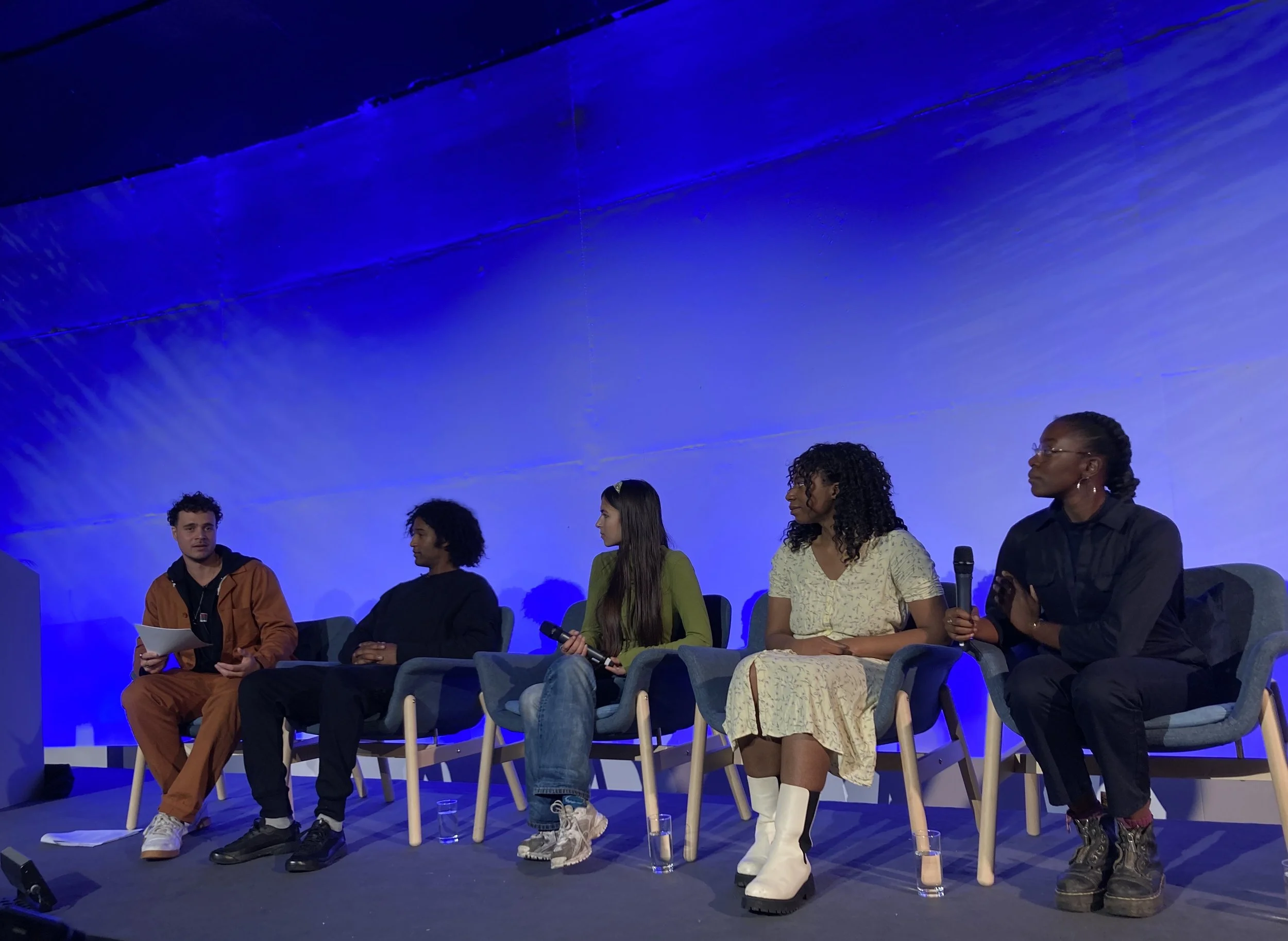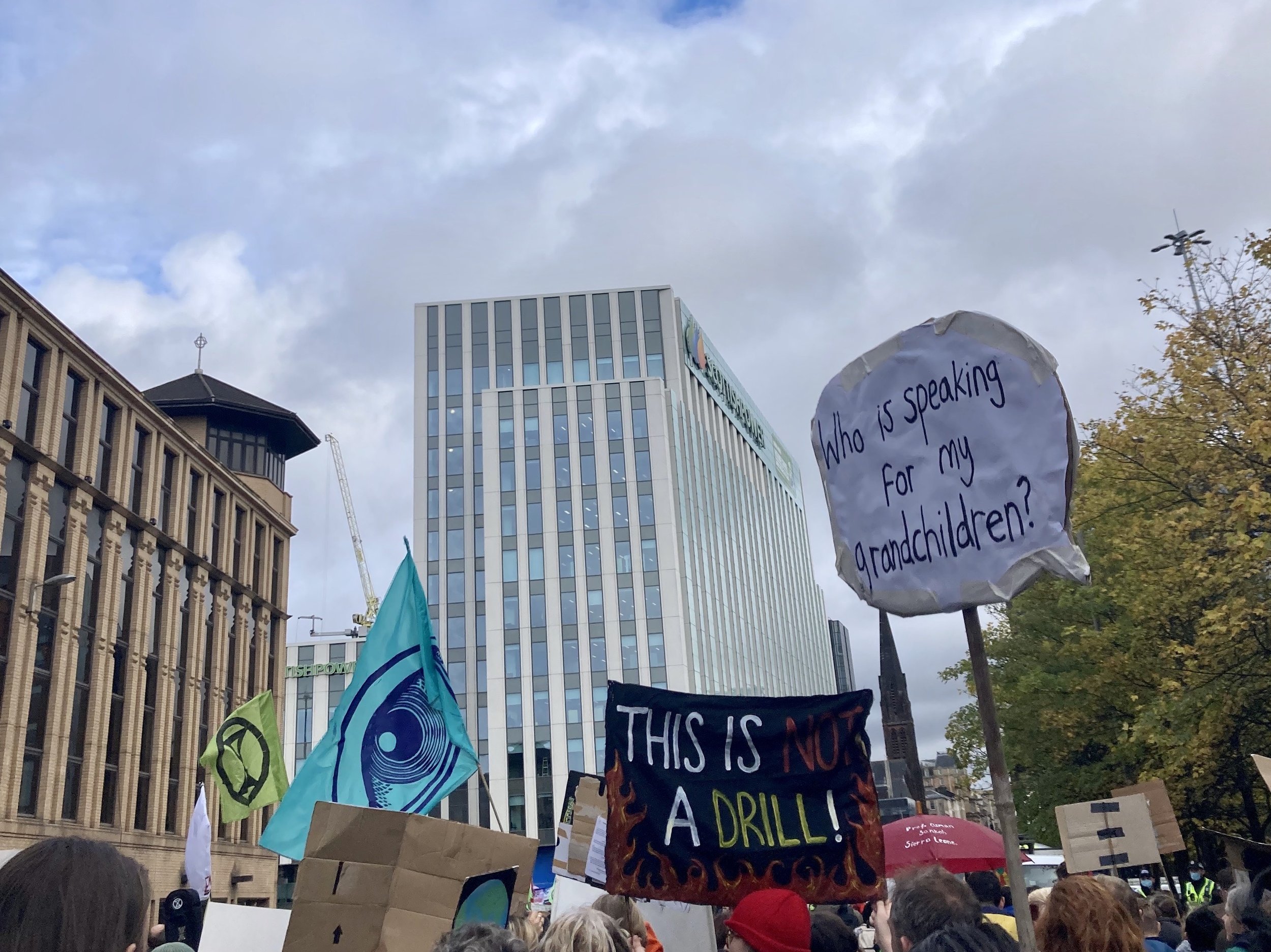A Foot in Two Worlds
During the closing speech of an innovation forum in Glasgow led by a multinational corporation at COP26, I sneaked a peek at my phone and saw a message ‘Quick, come and find us! People power!’.
When the event has finished, I say my goodbyes, and dash out of the Marriott Hotel, finding a corner to swap my shoes so I could sprint to slip into the Youth March led by the Friday for Future Scotland, snaking its way through the city centre. I look at my feet in transition, one foot in my most formal heeled boots and the other in my most scruffy muddied trainers, and I see a symbolic image of my current division between two worlds - one foot in the world of corporate sustainability and the other in anti-capitalist grassroots collective action, oscillating within and outside the system.
Over the next few days I also attended a government agency run innovation panel as well as a panel of young activists of colour, led by my hip hop musician / zoologist brother, discussing the systemic and systematic severing of black and brown people from their connection to the natural world, both of which gave me further flavour of the many different types of spaces and conversations around climate action during COP26.
Nature Aint A Luxury Panel
Hosted by Louis VI, featuring Nadeem Perera, (Flock Together), Mya-Rose Craig (Birdgirl), Dominique Palmer (Fridays for Future) and Joycelyn Longdon (Climate in Colour).
If you asked me two years ago whether I would be working in the corporate sustainability sector, specifically the field that ties together profit and purpose as mutually compatible goals, I might have sneered and said “Those two things are an oxymoron. Making profit will always leave someone or something exploited - the real costs are paid for by people and the environment. How can you solve the environmental crisis through the same logic of infinite growth that got us in this mess in the first place?”
Yet, what is more challenging and complex is finding yourself in a job that gives you access to a different world, trying to sit with the cognitive dissonance, to open your mind to understand its layers of power and potential as a driver for change and the motivations of the other people working within it, and to explore how to raise your voice in a meaningful way and stay true to your vision of a better, more just world.
So when Roland Harwood invited me to participate in several corporate-led sustainability projects as part of my role at Liminal, I was open with him in a way that few people can really be with their colleague. I told him I didn’t want to have anything to do with corporate greenwashing, and that it felt more dangerous than companies doing nothing at all; giving an illusion of security whilst enabling business-as-usual with high emissions and extractivist processes. He listened and said he wanted me to use this perspective to hold the project and its deliverables to account.
Having returned from COP26 I want to share some reflections on ways my mind has changed through doing this work and how I reconcile this internal discord:
Power = Responsibility. Whether we like it or not, business wields an incredible amount of power and control over our lives, the use of land and natural resources, the production of emissions and waste, over government policy and democracy and the way we interact with technology. Business is in such a critical position to reverse and mitigate climate change because we simply cannot do it without them. We must hold their power accountable.
Timing is Everything. The IPCC tells us we have 9 years to radically change our dependency on fossil fuels to mitigate the worst impacts of climate change and avoid irreversibly tipping our delicate weather systems and ecosystems over the edge. As much as the ideal long-term goal may be a radical disruption of our existing institutions and the eternal growth paradigms they are based on, adapting our current systems of power and working within and transforming existing institutions is also necessary.
Pace Setting. Recent research led by New Economics Foundation and Friends of the Earth showed us that the UK government has over 40 new potential fossil fuel projects in the pipeline over the next 3 years, demonstrating the unlikelihood of simultaneously legislating the necessary policy landscape needed to make such investment non-viable and non-profitable in the timeframe that we need. Perhaps unrestrained from stagnant electoral cycles, corporations who do see the long-term business case for fully transitioning to a decarbonised economy can use their political influence to foster tipping points towards green energy and set the pace faster than governments. Can businesses respond to people as consumers, faster than the state can respond to people as voters? If the state will not tame big business, perhaps businesses must be convinced that they will be rewarded for trailblazing and left behind if they delay action.
Pressure from Within. Pressure towards radical systems change must come from all directions, and corporate activists can create necessary internal pressure. To use corporate language to your advantage, to disarm people with integrity, to interrogate the ‘blah blah blah’, to speak up in meetings in a job that you can’t afford to lose, to hold your employers to account on their climate targets, can be isolating and daunting, yet really powerful. The good news is that employee activism towards climate action on the rise. Taking a too narrow definition of activism as roaring into the system from the outside-in may be counterproductive; preventing employees in the private sector from seeing themselves as changemakers too, despite the likelihood of their voices actually being heard closer to the decision making.
People’s Faces. Lots of good, decent people who want to be on the right side of history end up working for businesses which have created and are still creating significant environmental harm. I know that many people working for big emitters wondering if they are doing the right thing, thinking probably not, but then getting distracted and absorbed by life’s incessant demands. Empowering people working in businesses to feel they actually have a say in the direction of their companies is really important, as is understanding the leverage points and levers of change within organisations that often act and exist as whole systems in themselves.
Changing our minds and opening them up to different perspectives can be really hard. Yet, I am learning that it is possible and necessary to be both radical and pragmatic, to avoid the binaries of within and outside the system, private and public, and to rather find a home in the spectrums that make up reality and see the power in understanding the arguments and language of each end.
Can we try to dismantle the system and improve it from within at the same time? To engage in movements for climate justice and consciousness raising pushing from ground up whilst working with business and governments and creating pressure from within?
I am still searching for a space to hold both truths. That environmental degradation is built into capitalism but that the private sector must be part of our imminent salvation. That corporate power needs to be restricted but they might just hold some of the keys to our urgent energy transition. That technological climate solutions will never be the answer, but that they could be a tool to build newer, smarter, fairer systems.
What have you changed your mind about recently and why?



